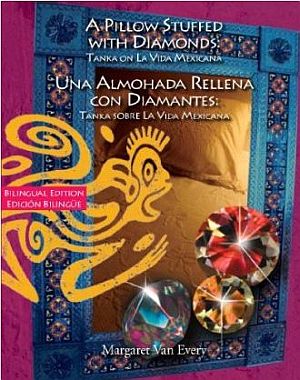A Pillow Stuffed with Diamonds is a book of Mexico Tanka Poetry by Margaret Van Every. In addition to poetry, Van Every is an accomplished musician, champion swimmer and writer/editor. When she entered Mexico, her experiences were deftly transformed into finely-nuanced poetry.
Van Every's bilingual lyric poetry, following the seventh century Japanese five-line Tanka format, affords the reader one pleasurable moment after another. With well-honed sensibilities she unveils her day-by-day confrontation with Mexican culture and its people — a confrontation that soon became a love affair.
This profound and provocative collection of poems offers a cross section of Margaret's experiences, beginning with her arrival and travel through Mexico, and coming into full bloom when she reflects on her human and cultural encounters. Persistent honesty and penetrating observations combine with this poet's mature intellect to create poems that are ingenious. Each poem delights, expands and enlightens the reader's consciousness.
Van Every states that, "In A Pillow Stuffed with Diamonds I found tanka to be both compatible with my voice and the perfect vehicle for encapsulating the emotional and visual snapshots of my experience. What could be better than distilling an idea in five lines finished off by some twist?"
Her poems' organic form, their innate nature, has been developed with unswerving respect for cultural norms and inside understandings. The nuances of human strengths and frailties come to life.
Tanka (short songs) depends on an "aha!" moment where some unexpected truth is dramatically revealed at the end. For example, in "The Adelitas," a 'double-entendre' in the last two lines (written with unblinking honesty) forces the reader to reconsider the whole of the poem in relationship to his or her own life experience.
Margaret has the ability to impart depth and texture to establish a context that gives solidarity and a strong sense of place and time to her verse. This, when combined with realized truths, make her work unique in its capacity to reveal the "secrets" of life. For Margaret, form becomes a structure that reveals and then enhances what has been discovered.
In "Jesús," profound and complex meaning has been compressed into just a few words. We learn from Jesús, dancing teacher, the lost art of keeping the beat — moving with grace to music ignoring a gaping wound. The reader is left wondering what gaping wounds of their own, or their societies, are being kept out of sight. Or are the wounds suffered by Jesús to be our concern?
In both poems, as well as in most of Margaret's long and short pieces, images are juxtaposed to challenge the reader to new openness in his or her own understanding of what it means to be human in a fractured, self-interested, normally unobservant, unconscious society. With every word tuned to the proper pitch, the high energy of her poems moves successfully from poet to reader.
Both poetry and music, docile under her mastery, have provided Margaret a way to deal with the joys of life as well as the pain of losses and breakdowns in personal relationships — all to the reader's gain. As an artist deeply concerned with the health of the human community, Margaret Van Every's poetic voice resonates, awakens and stimulates.


